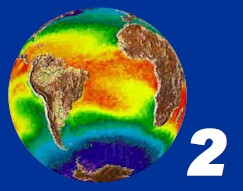|
|
|
WWF Climate
Publications |
|
THE IMPACT
ON OUR HEALTH |
 |
|
|
Cold kills
germs. It also destroys disease-bearing insects such as the
anopheles mosquito. But as the world
warms
up, the chances of survival for germs, bacteria,
spores, and other
carriers are increasing substantially.
Climate-related
disease outbreaks
|
|
1 |
Hantavirus
outbreak in 1993 related to
drought followed by heavy rains. |
|
2 |
Over 500 deaths during
1995
heatwave. |
|
3 |
Dengue outbreaks in 1993, 1994,
and 1995 following unusually hot and humid conditions. |
|
4 |
1995: mosquito-borne
encephalitis; rodent-borne leptospirosis; fish killed by toxic
algae. |
|
5 |
Cholera outbreak in 1991
associated with unusually warm ocean waters and coastal algae
blooms. |
|
6 |
Dengue outbreak, 1992. |
|
7 |
1996: meningitis epidemic
following hot dry weather. |
|
8 |
Rift Valley
fever, 1993. |
|
9 |
Yellow fever, 1993. |
|
10 |
Malaria
newly reported in highland
areas,1987-1990. |
|
11 |
Plague, dengue, and
malaria outbreaks after
extraordinary heat followed by
floods. |
|
12 |
New
strain of cholera emerges in
1993 following heavy
monsoons. |
|
13 |
Dengue associated with
"El Niño". |
|
14 |
Dengue outbreak in 1992. |
|
|
|
What is good for germs is
rarely healthy for humans. Longer and hotter heatwaves caused by
climate change are creating perfect
breeding
conditions for rodents, and plague has recently been reported in
five countries.
More cases of dengue fever are being notified than in the past,
and the spread of malaria has already reached alarming
proportions: nearly 300 million people around the world are now
infected with this parasitic disease, and some scientists
calculate that it will cause a further 50 million deaths within
the next half century.
It is predicted
that heatwaves will also lead to the deaths of thousands of
people every year from heart and
lung
diseases. Especially at risk will be people in large cities. |
|
|
|
GLOSSARY |
|
germs:
disease-causing bacteria, microbes (gérmenes, microbios)
warms up: gets warmer
(aumenta su temperatura)
spores: single-celled reproductive bodies produced especially by certain bacteria, algae and fungi
(esporas)
carriers: microbes which are a vehicle for diseases
(portadores)
outbreak: a sudden violent spontaneous occurrence of an undesirable condition
(brote)
drought: shortage of rainfall, no water
(sequía)
heatwave: a period of unusually hot weather
(ola de calor)
dengue: an infectious disease of the tropics transmitted by mosquitoes
(dengue)
algae: aquatic organisms
(algas)
blooms: proliferation, rapid multiplication
(proliferación) |
fever: a rise in the temperature of the body; frequently a symptom of infection
(fiebre)
newly: very recently
(recientemente)
plague: a serious (sometimes fatal) infection (especially bubonic plague)
(plagas infecciosas)
malaria: an infective disease caused by an infected Anopheles mosquito
(malaria)
floods: inundations, excess of rainfall
(inundaciones)
monsoon: a seasonal wind in Southern Asia
(vientos monsónicos)
breeding: reproduction
(de reproducción)
it is predicted that: scientists predict that
(se estima que)
lung diseases: respiratory organ illnesses (enfermedades pulmonares) |
|
|
Click here to read
CLIMATE CRISIS III |
|
 |
|
MAS "ECOLOGIA - MEDIO AMBIENTE"
FORO
INICIO |
|